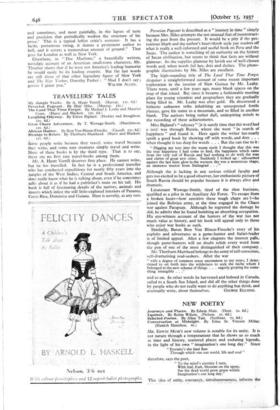TRAVELLERS' TALES
The Land That Time Forgot. By Michael J. Leahy and Maurice CraM. (Hurst and Blacken. 12s. 6d.)
Gran Chaco Adventure. By T. Wewege-Smith. (Hutchinson.
• 12S. 6d.) 1.2s. 6d.)
SOME people write because they travel, some travel because they write, and some rare creatures simply travel and write. None of these books is by the third type. That is to say, there are no first rate travel-books among them.
. Mr. A. Hyatt Verrill deserves first place. He cannot write, but he has travelled. In fact he is a professional traveller who has conducted expeditions for nearly fifty years into the jungles of the West Indies, Central and South America, and does really know what he is talking about, even if he sometimes ,talks about it as if he had a publisher's mate on his tail. His book is full of fascinating details of the natives, animals and insects which infest the still little-explored interiors of Panama, Costa Rica, Dominica and Guiana. Here is novelty, at any rate. Peruvian Pageant is described as a "journey in time " simply because Mrs. Niles attempts the not unusual feat ,of,reconstruct- ing the past from the present. It would be a pity if the pre- tentious blurb and the author's heart-throb style put readers off what is really a well-informed and useful book on Peru and the Incas. The author is something of an authority on the history of Incan civilisation, but seems to think that facts are without glamour. So she supplies glamour by lavish use of well-chosen words and, when words fail her, dots and dashes. The photo- graphic illustrations by Mr. Niles are excellent.
The high-sounding title of The Land That Time Forgot disguises a straightforward account of some recent important
-exploration in the interior of New Guinea by Mr. Leahy. There were, until a few years ago, many blank spaces on the map of that island. But since it became a fashionable meeting place for young scientists and geographers they are gradually being filled in. Mr. Leahy was after gold. He discovered a hitherto unknown tribe inhabiting an unsuspected fertile plateau, gave his name to a mountain, and so filled in another blank. The authors bring rather dull, uninspiring minds to
the recording of these achievements.
Miss Bigland's " odyssey" (it is surely time that this word had a rest) was through Russia, where she went "in search of happiness" and found it. Here again the writer has nearly spoilt a good book by showing off with words, and dots . . .
when thought is too deep for words . . . But she can rise to it : "Digging my toes into the warm earth I thought that this was the true happiness I had come to find, the happiness which came from the very soil of Russia and had nothing to do with the roar and clatter of great new cities. Suddenly I looked up : silhouetted against the last faint glow in the western sky was a monstrous shape, an immense tractor from Stalingrad . . . '
Although she is lacking in any serious critical faculty and gets too excited to be a good observer, her enthusiastic picture of South Russia should be popular because it is always alive and dramatic.
Lieutenant Wewege-Smith, tired of the shoe business, qualified as a pilot in the Auxiliary Air Force. To escape from a broken heart—how sensitive these tough chaps are 1--he joined the Bolivian army, at the time engaged in the Chaco war against Paraguay. Although he regretted the damage he did, he admits that he found bombing an absorbing occupation. His eye-witness account of the horrors of the war has not much value as history, and his book will appeal only to those who enjoy war books as such.
Similarly, Baron Bror Von Blixen-Finecke's story of his exploits and adventures as a game-hunter and Safari-leader is of limited appeal. After a few chapters the interest palls, though game-hunters will no doubt relish every word from the pen of one of the most distinguished of their company.. Mr. Thorburn Muirhead belongs to the army of self-conscious, self-dramatising soul-seekers. After the war "with a degree of common sense uncommon to my years, I deter- mined to set forth into the wilderness to seek the niche where I belonged in the new scheme of things . . . eagerly groping for some- thing intangible . . ." • and so on. In other words he harvested and hoboed in Canada, sailed to a South Sea Island, and did all the other things done by people who do not really want to do anything but think, and eventually write, about themselves. GEORGE ELLIDGE.






















































 Previous page
Previous page